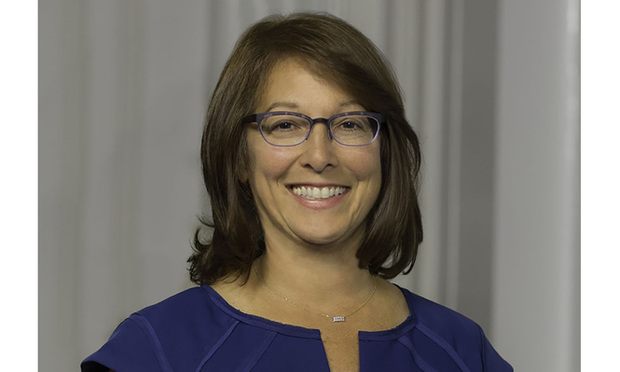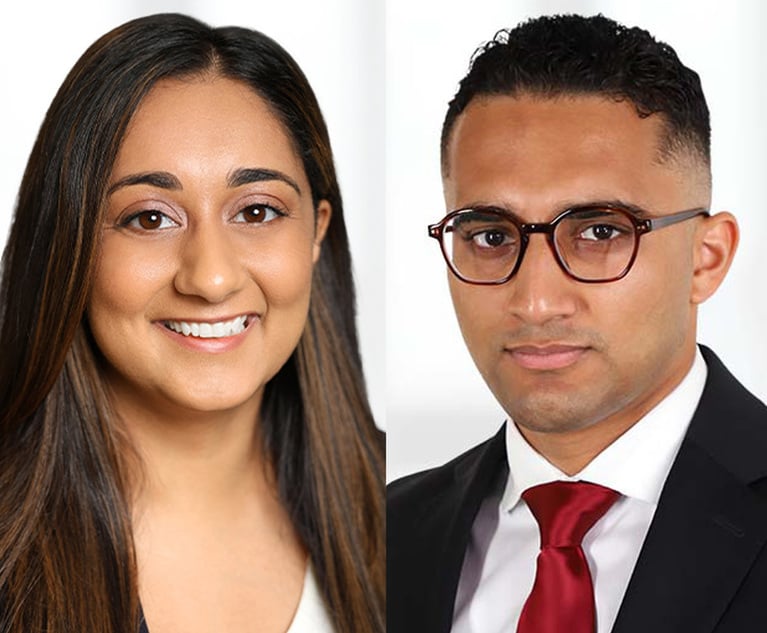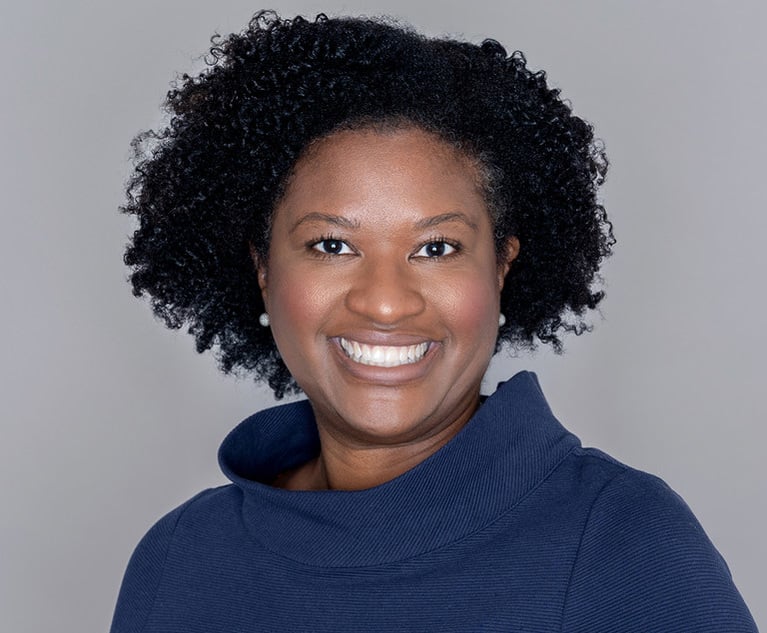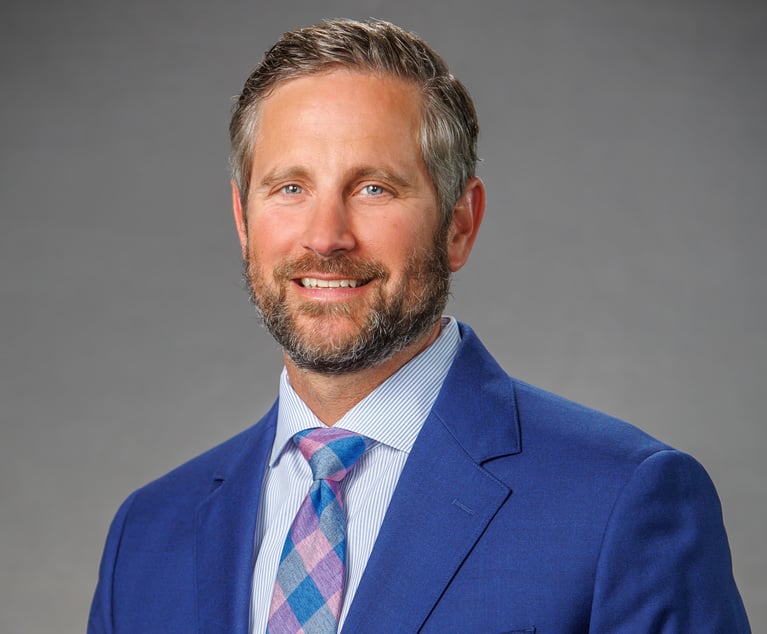Gross Talks Legal Aid Legacy After Term as Bar Chancellor
During her tenure, Deborah Gross was an outspoken chancellor, issuing statements on everything from a condemnation of U.S. Attorney Jeff Sessions to a call for former Philadelphia District Attorney R. Seth Williams to step down after he was indicted on bribery charges.
January 03, 2018 at 04:48 PM
5 minute read
 Deborah Gross.
Deborah Gross.
The Philadelphia legal community has seen few years as challenging as 2017, with its top law enforcement officer going to prison for bribery and the city administration often publicly at odds with federal law enforcement officials. The Philadelphia Bar Association's immediate past chancellor Deborah Gross was there to lead the organization through it all, acting not only as the voice, but also spearheading the group's efforts to provide legal aid services at a time when those resources appear to be increasingly in need.
During her tenure, Gross, a plaintiffs-side securities, fraud, antitrust and consumer class action attorney at Kaufman, Coren & Ress, was an outspoken chancellor, issuing statements on everything from a condemnation of U.S. Attorney Jeff Sessions to a call for former Philadelphia District Attorney R. Seth Williams to step down after he was indicted on bribery charges. Gross stepped down in December, and Fineman Krekstein & Harris attorney Mary Platt took over as chancellor. (The association is set to host a reception for Platt at the Hyatt at the Bellevue in Philadelphia on Thursday evening.)
The Legal spoke with Gross about her tenure. The following was edited for clarity and flow.
Q: What were the biggest challenges during your tenure?
A: The biggest challenges were the membership, and being relevant to our members. I wanted to make sure we were making statements that were not partisan, but were even-handed and addressed the various issues that arose.
We had during my year, issues ranging from the importance of judicial independence and the rule of law. We actually called on Seth Williams to step down, and spoke about the hate crimes and the shootings.
Q: What were the difficulties in putting out these statements, and how did you manage to get consensus?
A: It was an interesting learning experience. A lot of people wanted statements quickly. But we wanted to make sure that we had information, that it affected the rule of law and the courts, and that the position was supported by the Constitution as opposed to a partisan viewpoint.
Q: What would you say were your biggest accomplishments?
A: They were multifaceted, I will say. I gave more recognition to the bar association through the various statements and the various forums, and the Take Action Philly concept that we worked on and implemented throughout the year.
The concept of Take Action Philly was to bring together a number of different groups and to collaborate on issues of major importance. We began with immigration. We had that program in February as a result of the immigration Take Action Philly. We had clinics where attorneys volunteered. That's going to continue. During my time we had a clinic every month, either a screening or a naturalization project. That's going to continue, although maybe not at the same pace.
We also had a Take Action Philly convening for Medicaid and next week we're having a Take Action Philly convening called “Black, White and Blue: Race and Justice in the 21st Century.”
The whole concept of Take Action Philly will continue because it's a collaboration of a lot of the local nonprofits with the bar association addressing issues of importance.
The other thing that was quite unique and a learning experience was, I went to Washington, D.C., to lobby for legal services funding. We also went to Harrisburg to support amendments to the hate crimes legislation. We here at our association got up and running on our legislative action site a program for people to support amendments to the hate crime bill.
It was a really good experience, and I enjoyed that. We also worked very closely with the city this year, and with Mayor [Jim] Kenney.
Q: What is next for you?
A: I'm going back to working full time for the firm [Kaufman Coren], and I'm going to continue to be involved in the pro bono legal community. The current chancellor has appointed me to the pro bono chair for the cabinet, and I will go back on the board of the Philadelphia Bar Foundation where I will champion the Equal Justice Center, and I'll be there to help Mary whenever she asks.
Q: Tell me about the Equal Justice Center, and how that is progressing.
A: The Equal Justice Center is going to be built on a site between Eighth and Ninth on Vine Street, and we will be housing about 20 legal nonprofits in one building to increase the efficiency of scale and collaboration. We're now in the process of looking at this site, meeting with the legal nonprofits, working on the physical layout of the building, and will be, shortly, embarking on fundraising. Our goal is to have the paperwork completed by October, and to have a shovel in the ground by October.
This content has been archived. It is available through our partners, LexisNexis® and Bloomberg Law.
To view this content, please continue to their sites.
Not a Lexis Subscriber?
Subscribe Now
Not a Bloomberg Law Subscriber?
Subscribe Now
NOT FOR REPRINT
© 2025 ALM Global, LLC, All Rights Reserved. Request academic re-use from www.copyright.com. All other uses, submit a request to [email protected]. For more information visit Asset & Logo Licensing.
You Might Like
View All



Trending Stories
- 1McCarter & English Adds Outgoing U.S. Attorney
- 2Chinese Firms Hire Partners from Kirkland and Paul Hastings in Hong Kong
- 3'He Used Some Colorful Language': Yale Defamation Case Survives
- 4Man Charged in Daylong Shooting Rampage in Memphis Is Serving as His Own Lawyer
- 5Counterpoint: FLA Is Committed To the Success of Legal Professionals
Who Got The Work
J. Brugh Lower of Gibbons has entered an appearance for industrial equipment supplier Devco Corporation in a pending trademark infringement lawsuit. The suit, accusing the defendant of selling knock-off Graco products, was filed Dec. 18 in New Jersey District Court by Rivkin Radler on behalf of Graco Inc. and Graco Minnesota. The case, assigned to U.S. District Judge Zahid N. Quraishi, is 3:24-cv-11294, Graco Inc. et al v. Devco Corporation.
Who Got The Work
Rebecca Maller-Stein and Kent A. Yalowitz of Arnold & Porter Kaye Scholer have entered their appearances for Hanaco Venture Capital and its executives, Lior Prosor and David Frankel, in a pending securities lawsuit. The action, filed on Dec. 24 in New York Southern District Court by Zell, Aron & Co. on behalf of Goldeneye Advisors, accuses the defendants of negligently and fraudulently managing the plaintiff's $1 million investment. The case, assigned to U.S. District Judge Vernon S. Broderick, is 1:24-cv-09918, Goldeneye Advisors, LLC v. Hanaco Venture Capital, Ltd. et al.
Who Got The Work
Attorneys from A&O Shearman has stepped in as defense counsel for Toronto-Dominion Bank and other defendants in a pending securities class action. The suit, filed Dec. 11 in New York Southern District Court by Bleichmar Fonti & Auld, accuses the defendants of concealing the bank's 'pervasive' deficiencies in regards to its compliance with the Bank Secrecy Act and the quality of its anti-money laundering controls. The case, assigned to U.S. District Judge Arun Subramanian, is 1:24-cv-09445, Gonzalez v. The Toronto-Dominion Bank et al.
Who Got The Work
Crown Castle International, a Pennsylvania company providing shared communications infrastructure, has turned to Luke D. Wolf of Gordon Rees Scully Mansukhani to fend off a pending breach-of-contract lawsuit. The court action, filed Nov. 25 in Michigan Eastern District Court by Hooper Hathaway PC on behalf of The Town Residences LLC, accuses Crown Castle of failing to transfer approximately $30,000 in utility payments from T-Mobile in breach of a roof-top lease and assignment agreement. The case, assigned to U.S. District Judge Susan K. Declercq, is 2:24-cv-13131, The Town Residences LLC v. T-Mobile US, Inc. et al.
Who Got The Work
Wilfred P. Coronato and Daniel M. Schwartz of McCarter & English have stepped in as defense counsel to Electrolux Home Products Inc. in a pending product liability lawsuit. The court action, filed Nov. 26 in New York Eastern District Court by Poulos Lopiccolo PC and Nagel Rice LLP on behalf of David Stern, alleges that the defendant's refrigerators’ drawers and shelving repeatedly break and fall apart within months after purchase. The case, assigned to U.S. District Judge Joan M. Azrack, is 2:24-cv-08204, Stern v. Electrolux Home Products, Inc.
Featured Firms
Law Offices of Gary Martin Hays & Associates, P.C.
(470) 294-1674
Law Offices of Mark E. Salomone
(857) 444-6468
Smith & Hassler
(713) 739-1250





